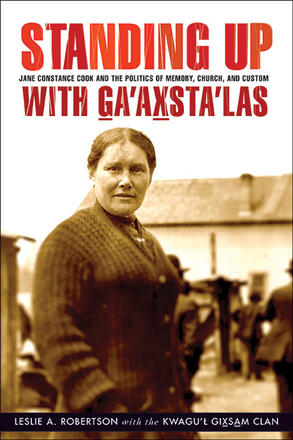
Standing Up with G̲a'ax̱sta'las
Jane Constance Cook and the Politics of Memory, Church, and Custom
A scholar and Cook’s descendants come together to reclaim the reputation of an important Kwakwa̱ka̱’wakw leader.
La description
Standing Up with Ga’axsta’las tells the remarkable story of Jane Constance Cook (1870-1951), a controversial Kwakwaka’wakw leader and activist who lived during a period of enormous colonial upheaval. Working collaboratively, Robertson and Cook’s descendants draw on oral histories and textual records to create a nuanced portrait of a high-ranked woman, a cultural mediator, devout Christian, and Aboriginal rights activist who criticized potlatch practices for surprising reasons. This powerful meditation on memory and cultural renewal documents how the Kwagu’l Gixsam have revived their long-dormant clan in the hopes of forging a positive cultural identity for future generations through feasting and potlatching.
Reviews
In this most innovative book, Robertson and the Gix̱sa̱m Clan collectively write a book that will quickly become a methodological model for ethnohistorians. The non-linear narrative, with the focus on an interaction between the anthropologist, the indigenous community (Cook’s descendants), and the memory of Cook, provides a way of dealing with memory and history through the presentation of multiple voices. As one committee member stated, “The book models a collaborative process that more and more of us will be challenged to undertake. I think the future of our profession is that we will be expected to write with, rather than about, Indigenous communities. That this book presented a cohesive narrative about a woman whose life was so complicated and whose memory has been so contested by weaving together the voices of so many contributors is stunning to me.”
- Award citation